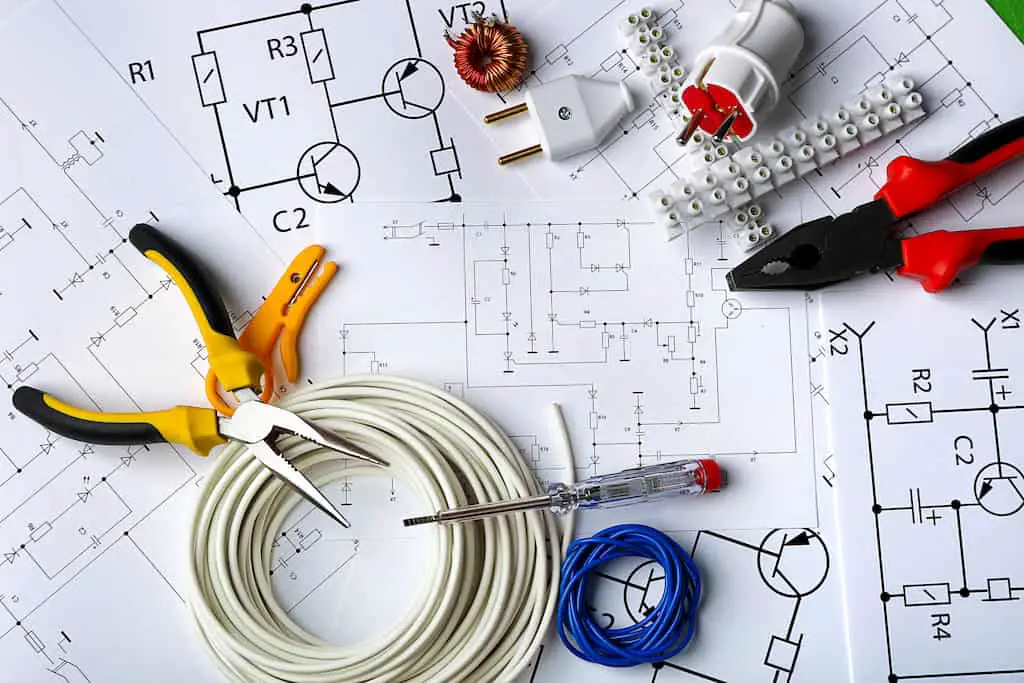How Long Does It Take To Rewire a House?

If the electrics in your home are malfunctioning or outdated, it may be time to hire an electrician for a complete rewire of your house. Rewiring is a messy and big job that can take some time to complete. So how long should it take for a trained electrician to rewire your house?
It will typically take between three and ten days for an electrician to rewire your house. The time required for the job depends on the size and age of your house and what electronics are being replaced. Older homes usually take at least seven days for a rewire due to the layout.
Keep reading to learn more in detail about rewiring your home. In this article, I will explore the costs of rewiring, what’s involved in the project and when it’s time to hire an electrician for a rewire. By the end of this article, you will have a better grasp of the maintenance required for the electronics and wiring in your home.
How Much Does It Cost To Rewire a House?
Rewiring a house is a large job that can take over a week for large homes with many wires. However, smaller homes can be rewired in just a few days as they require fewer materials and have fewer features that need care. So how much can you expect to pay for rewiring in your home?
The cost of a rewire varies greatly depending on the size of your home. Small homes cost $1500-$3000, while mid-range homes cost $3500 – $8,000, and large homes cost $8000- $20000 for a full rewire. Although, prices can vary depending on the features included in the property.
If you would like a more accurate estimate of what your rewiring will cost, you can use another calculation method. During a rewire, the control panel will need to be replaced—a control panel costs between $1200 and $2400 to replace, which must be considered.
Then you will need to measure the horizontal length of all the walls in your home in feet. Next, you must multiply the horizontal wall length by $7. This will provide you with a rough estimate of the cost of a rewire in your home. However, costs may vary depending on the electrician and location.
Can You Live in a House While It’s Being Rewired?
Rewiring a home can be a messy job as walls, and sometimes ceilings and floors need to be removed so the electrician can access the wires. There will also likely be exposed wires in parts of your home. As a result, you may be wondering whether it’s safe for you and your family to stay at home while all of this is going on?
You can live in a house while it’s being rewired. However, there will likely be dust and mess around your home due to holes made in the walls. The electrical can cut the power supply of exposed wires to ensure your safety and prevent any unfortunate accidents from occurring.
While you can live at home during a rewire, it may not be the best idea. If you live in your home, the electrician will need to work around furniture and features in your home. Whereas if you aren’t living at home, furniture and features can be moved to allow the expert to work efficiently.
On top of this, the electrician can work without interruption when no one is home. However, paying for a hotel or staying at a relative’s is not an option for many homeowners, so staying put during the wire is their only option.
What’s Included in Rewiring a House?
Rewiring a house is a messy project that includes several different elements. If you spend thousands of dollars on a job, you will likely be eager to learn what the electrician will be doing during the project. So what exactly is involved in rewiring a house?
Rewiring a house involves removing and replacing all the wires in every room of your home. The job requires a qualified electrician or even a team of electricians for the job. Lights, sockets, switches, and the control panel will all be removed and replaced with modem upgrades.
During the rewire, electricians will likely have to lift carpets and floorboards to access wires running underneath. They may also have to cut small holes in your walls for a process called chasing. Chasing is when the electricians run the cables through walls to their destination.
How To Know If You Need To Rewire Your House?
Now that you know what’s included in rewiring a house and how much you can expect to pay for the job, it’s time to figure out how to know if you need to rewire your house. So what indicators should you look out for to let you know that it’s time to call an electrician for a rewire in your home?
Here are some crucial indicators to show that you need to rewire your house:
- Faulty/ Flickering lights
- Fuses blowing regularly
- Sparks coming from outlets
- Fluctuations in power
- Electric shocks
- Power variations
Rewiring your house is a vital safety practice that protects your home against fire. As wires and electrical components age, they can degrade, leading to sparks and other electrical faults. Sparks can land on dry materials like insulation which can quickly lead to a fire in your home.
Rewiring your home also ensures that you have modern electrical components installed in your house. Modern electrical components are designed to be environmentally friendly and energy-efficient. Improvements to your energy efficiency will lead to savings on your electricity bills.
Another advantage to rewiring your house is the added convenience. If you are short on sockets in your home, a rewire can allow you to add a few more. This reduces your dependency on extension cords and adapters while providing you with added convenience in your home.
How Often Does a House Need Rewiring?
A whole-house rewiring is an extensive job that usually comes with a high price tag. As a result, you’re likely wondering how long your new rewiring is capable of lasting. So how long should you expect to get from your new rewiring before you need to pay for another rewire?
A house needs rewiring every twenty years or so. However, some rewiring jobs can last for as long as forty years. Rewiring is required when the insulation around the rewires in your home starts to degrade, resulting in faulty electronics and safety risks for residents of your home.
If you think that your home may be due a rewiring, contact an electrician and ask them to carry out an electrical inspection. This will provide the electrician with information regarding the condition of your electrics. An electrical inspection may show minor issues in your home, which will be cheaper and quicker to fix than a full rewire.
Final Thoughts
Rewiring a home is a big job that typically takes between 3 and 10 days to complete. Rewiring a house is a crucial piece of maintenance that is often one of the most significant expenses in keeping your home in good condition. You can pay as much as $20,000 for a rewire, depending on the size of your home.
Rewiring a house is typically needed every 20 years or so. However, there are some indicators that your home needs a rewire sooner. If you believe that your home needs a rewire, contact a qualified plumber to find out more.





